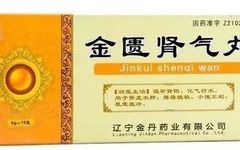Yang deficiency refers to the decline of Yang Qi in the body, leading to reduced function or weakness, decreased metabolic activity, and low reactivity, which is a pathological phenomenon of insufficient Yang heat. Due to insufficient Yang Qi, the body’s ability to resist cold decreases, thus the Yang deficient constitution is characterized by ‘cold’ symptoms, mainly manifested as insufficient Yang Qi, fear of cold, cold hands and feet, etc. Other manifestations often include fatigue, pale lips, shortness of breath, poor digestion, loose stools, a pale and swollen tongue, decreased libido, a weak and deep pulse, preference for warm food, and intolerance to winter. Those who frequently consume cold and cool foods, cool teas, or cooling detoxifying herbs, as well as those who overexert themselves sexually, are prone to Yang deficiency.
Individuals with Yang deficiency are particularly sensitive to cold, especially in the abdomen or back. Cold hands and feet do not necessarily indicate Yang deficiency; they may also be related to Qi and blood deficiency. Those with Yang deficiency should appropriately consume more foods that warm and tonify kidney Yang, such as lamb, beef, dog meat, venison, hairtail fish, sparrow meat, chicken, yellow eel, pig stomach, shrimp, grass carp, ginger, scallions, garlic, leeks, okra, mustard seeds, pepper, fennel, longan, lychee, lotus seeds, chestnuts, and walnuts. Herbal medicines that can be selected include those that warm and tonify the kidney and liver, such as deer antler (lu rong), epimedium (yin yang huo), sea dog kidney (hai gou shen), gecko (he jia), cordyceps (dong chong xia cao), morinda root (ba ji tian), goji berries (gou qi zi), epimedium (xian mao), cistanche (rou cong rong), cardamom seeds (yi zhi ren), dodder seeds (tu si zi), psoralea (bu guo zi), eucommia (du zhong), purple river vehicle (zi he che), and sand seeds (sha yuan zi). It is important to avoid eating raw or cold foods such as watermelon, bitter melon, winter melon, water spinach, Chinese cabbage, bamboo shoots, kelp, mung beans, nori, grapefruit, bananas, pears, and sugarcane. During autumn and winter, it is advisable to wear warm clothing, avoid staying up late, and consume warm food to nourish Yang Qi. In summer, one should avoid intense exercise to prevent excessive sweating, which can harm Yang, and should not indulge in cold drinks.
Individuals with Yang deficiency can choose some traditional Chinese medicines for regulation. Below, we introduce ten types of traditional Chinese medicines for Yang deficiency for your reference. Note that the efficacy and indications of the following traditional Chinese medicines vary, and they should be used based on differential diagnosis.
Kidney Yang deficiency: Main symptoms include soreness and pain in the lower back and knees, fear of cold, fatigue, frequent urination, and edema. Traditional Chinese medicines for kidney Yang deficiency include Jin Kui Shen Qi Wan, Gui Fu Di Huang Wan, Si Shen Wan, You Gui Wan, Ji Sheng Shen Qi Wan, and Suo Yang Guo Jing Wan.
1. Jin Kui Shen Qi Wan: Composed of dihuang (Rehmannia), shanyao (Chinese yam), jiu yu rou (wine-soaked cornelian cherry), fuling (Poria), mudanpi (peony root), zexie (water plantain), guizhi (cinnamon twig), fuzi (prepared aconite), niuxi (ox knee, head removed), and xianqianzi (salty plantain seed). It warms and tonifies kidney Yang, transforms Qi, and promotes urination. It is used for kidney deficiency with edema, soreness in the lower back and knees, difficulty urinating, and fear of cold with cold limbs.
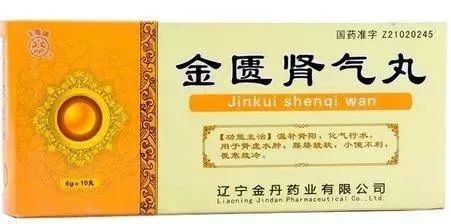
2. Gui Fu Di Huang Wan: Composed of rougui (cinnamon), fuzi (prepared aconite), shudi (cooked rehmannia), jiu yu rou (wine-soaked cornelian cherry), mudanpi (peony root), shanyao (Chinese yam), fuling (Poria), and zexie (water plantain). It warms and tonifies kidney Yang. It is used for insufficient kidney Yang, soreness and coldness in the lower back and knees, difficulty urinating or frequent urination, and phlegm-damp cough. Not suitable for those with Yin deficiency and internal heat.
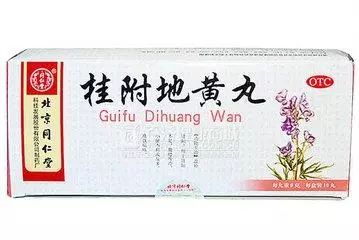
3. Ji Sheng Shen Qi Wan: Composed of shudi (cooked rehmannia), shanzhuyu (cornelian cherry), mudanpi (peony root), shanyao (Chinese yam), fuling (Poria), zexie (water plantain), rougui (cinnamon), fuzi (prepared aconite), niuxi (ox knee), and xianqianzi (salty plantain seed). It warms the kidney, transforms Qi, and promotes urination to reduce edema. It is used for kidney Yang deficiency with water retention, heavy sensation in the lower back and knees, difficulty urinating, and phlegm-damp cough.
4. Si Shen Wan: Composed of sharen (roasted nutmeg), buguzhi (salt-fried psoralea), wuweizi (vinegar-prepared schisandra), wuzhuyu (prepared evodia), and dazao (pitted jujube). It warms the kidney, disperses cold, and astringes the intestines to stop diarrhea. It is used for diarrhea due to kidney Yang deficiency, with symptoms of abdominal rumbling, bloating, early morning diarrhea, poor appetite, and persistent diarrhea with cold limbs.
5. You Gui Wan: Composed of shudi (cooked rehmannia), fuzi (prepared aconite), rougui (cinnamon), shanyao (Chinese yam), shanzhuyu (cornelian cherry), tusizi (dodder seeds), luji (deer antler glue), gouqizi (goji berries), danggui (angelica), and duzhong (salt-fried eucommia). It warms and tonifies kidney Yang, replenishes essence, and stops leakage. It is used for kidney Yang deficiency, decline of Mingmen fire, soreness and coldness in the lower back and knees, fatigue, fear of cold, impotence, nocturnal emissions, and frequent clear urination.
Spleen Yang deficiency, also known as spleen deficiency cold syndrome, often manifests as poor appetite, indigestion, belching with sour regurgitation, loose stools, abdominal bloating, and pain. The normal function of the spleen is essential for the growth and fullness of Yang Qi. Those with spleen Yang deficiency can choose Fuzi Lizhong Wan or Gui Fu Lizhong Wan.
6. Fuzi Lizhong Wan: Composed of fuzi (prepared aconite), dangshen (Codonopsis), baizhu (white atractylodes), ganjiang (dried ginger), and gancao (licorice). It warms the middle and strengthens the spleen. It is used for spleen and stomach deficiency cold, with cold pain in the abdomen, vomiting, diarrhea, and cold hands and feet.
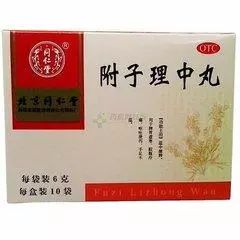
Stomach Yang deficiency, also known as stomach deficiency cold syndrome, often manifests as cold pain in the stomach, preference for warmth and pressure, cold limbs, and vomiting. Traditional Chinese medicines for stomach Yang deficiency include Xiangsha Yangwei Wan, Xiao Jianzhong Granules, Si Ni San, An Zhong Pian, Weichang San, and Bawei Rougui Capsules.
7. Xiangsha Yangwei Wan: Composed of muxiang (saussurea), sharen (cardamom), baizhu (white atractylodes), chenpi (dried tangerine peel), fuling (Poria), banxia (prepared pinellia), cu xiangfu (vinegar-prepared cyperus), zhishi (fried bitter orange), doukou (cardamom), jiang houpo (dried magnolia bark), guanghuoxiang (patchouli), gancao (licorice), dazao (jujube), and shengjiang (fresh ginger). It warms the middle and harmonizes the stomach. It is used for stomach Yang deficiency and damp obstruction causing stomach pain and fullness, with symptoms of dull stomach pain, discomfort, vomiting sour fluid, and lack of appetite, along with fatigue in the limbs. Not suitable for those with stomach Yin deficiency, which is mainly characterized by dry mouth, desire to drink, dry stools, and scanty urination.
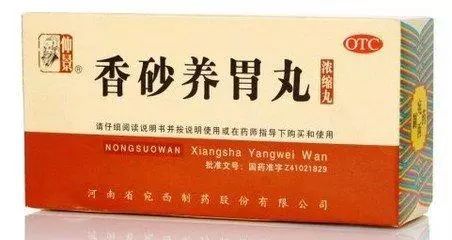
8. Xiao Jianzhong Pian: Composed of baishao (white peony), dazao (jujube), guizhi (cinnamon twig), jiu gancao (burnt licorice), and shengjiang (fresh ginger). It warms the middle, replenishes deficiency, and alleviates pain. It is used for spleen and stomach deficiency cold, with abdominal pain, preference for warmth and pressure, discomfort, sour regurgitation, poor appetite, and alternating symptoms of diarrhea and constipation in chronic colitis, as well as gastric and duodenal ulcers. Not suitable for those with spleen and stomach damp-heat.
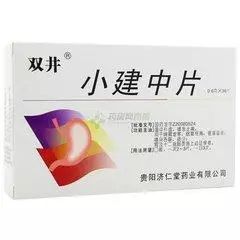
Heart Yang deficiency: Caused by damage to Yang Qi, leading to internal cold and cold sweat, with clinical manifestations of chest tightness, chest pain, palpitations, cold sweat, and cold limbs. Traditional Chinese medicines for heart Yang deficiency include Shenfu Qiangxin Wan and Qi Li Qiangxin Capsules.
9. Shenfu Qiangxin Wan: Composed of ren shen (ginseng), fuzi (prepared aconite), sangbai pi (mulberry bark), zhuling (polyporus), and tingli zi (descurainia). It tonifies Qi, assists Yang, strengthens the heart, and promotes urination. It is used for palpitations, shortness of breath, chest tightness, and edema due to chronic heart failure, belonging to heart and kidney Yang deficiency.
Liver Yang deficiency: Refers to insufficient Yang Qi in the liver leading to internal cold and stagnation of fire. Symptoms often include dizziness, pain in the flanks, depression, excessive worry, irregular menstruation, abdominal pain, and irritability. Traditional Chinese medicines for liver Yang deficiency include Shixiang Wan and Huixiang Juhua Wan.
10. Shixiang Wan: Composed of chenxiang (agarwood), muxiang (saussurea), dingxiang (clove), xiaohui (fennel), xiangfu (cyperus), chenpi (dried tangerine peel), wuyao (lindera), zexie (water plantain), litchi seed (fried), and pig tooth soap. It promotes liver Qi, disperses cold, and alleviates pain. It is used for hernia and abdominal pain caused by Qi stagnation and cold accumulation. Note that it is not suitable for hernias caused by damp-heat invasion, blood stasis, or Qi deficiency, and pig tooth soap is toxic and should not be taken in excess or for long periods.
Director Ning provides you with health and wellness knowledge.Click below to↓↓↓ follow for free
Note: Some text and image resources in this article are sourced from the internet. The purpose of reprinting this article is to convey more information. If there are any errors in source attribution or infringement of your legal rights, please notify us immediately. If the situation is confirmed, we will delete it promptly and apologize to you.
You might also be interested in:
These 10 medical beauty “scams” that pay an intelligence tax, don’t be foolishly following the trend, be careful of life-threatening risks.
Incorrect sleeping positions can easily harm the body! Expert interpretation: 2 sleeping positions that protect the waist and are healthy, try them tonight.
Eating some longan every day can yield 3 major benefits, but be aware of the several contraindications for consuming longan.

